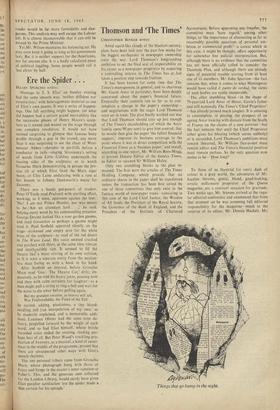Ere the Spider . . .
IJILARY SPURLING writes: 'Homage to T. S. Eliot' on Sunday evening had the same smooth way. 'neither diffident nor ostentatious,' with heterogeneous material as one of Eliot's own poems. It was a series of happen- ings. One felt anything might happen, yet what did happen had a certain grand inevitability like the successive phases of Henry Moore's sculp- ture as it waxed and waned on the stage through one complete revolution. It would not have seemed surprising to glimpse that famous bony profile through a gap in the crowd; any more than it was surprising to see the choir of West- minster Abbey—cherubic in pie-frills before a conductor in tails—singing Stravinsky's setting of words from Little Gidding underneath the soaring sides of the sculpture; or to watch Groucho Marx demonstrating in person the pre- cise tilt at which Eliot liked the Marx cigar worn; or Cleo Laine undulating with a rose at her bosom to Johnny Dankworth's. music for Sweenty.
There was a heady pot-pourri of readers. Peter O'Toole read Pm f rock with startling effect, Working, as it were, upstream •against the text: `No! I am not Prince Hamlet, nor was meant to be;/Am an attendant lord . . .,' he said, belying every word by his commanding presence. George Devine looked like a sour garden gnome, and read Gerontion as perhaps a gnome might read it. Paul Scofield appeared silently on the stage—darkened and empty save for the white mass of the sculpture--to read of the red desert in The Waste Land. His voice seemed cracked and parched with thirst, at the same time vibrant and inexhaustibly rich. It seemed to fill the theatre like a beast stirring of its own volition, as if it were a separate entity from the motion- less man facing us with a book in his hand.
After Scofield an interval, before Groucho Marx read 'Gus: The Theatre Cat,' drily, im- passively, as he told his hoary jokes, pausing now and then with calm certainty for laughter—as a man might pull a string to ring a bell and wait for the noise to die away before pulling again.
But my grandest creation, as history will tell, Was Firefrorcfiddle, the Fiend of the Fell,
he recited, adding, pianissimo, a tiny blood- curdling yell ('an interpolation of my own,' as he modestly explained, and a memorable addi- tion), Laurence Olivier had the same even de- livery, propelled forward by the weight of each word, and so had Eliot himself, whose brittle recorded voice ended the evening, reading per- haps best of all. But Peter Wood's crackling pro- duction of Sweeney, as a musical, a kind of sweet- meat in the middle of the programme, proved that there are unsuspected other ways with Eliot's speech rhythms.
The one personal tribute came from Groucho Marx, whose photograph hung with those of Joyce and Synge in the master's inner sanctum at Faber's. This, and the generous sum collected for the London Library, would surely have given Eliot peculiar satisfaction 'ere the spider made a thin curtain for his epitaph.'






























 Previous page
Previous page